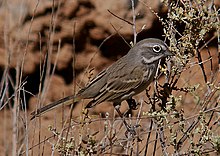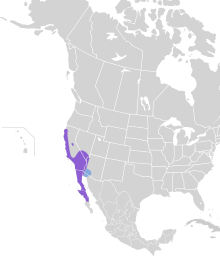Bell's sparrow
| Bell's sparrow | |
|---|---|

| |
| Scientific classification | |
| Domain: | Eukaryota |
| Kingdom: | Animalia |
| Phylum: | Chordata |
| Class: | Aves |
| Order: | Passeriformes |
| Family: | Passerellidae |
| Genus: | Artemisiospiza |
| Species: | A. belli
|
| Binomial name | |
| Artemisiospiza belli (Cassin, 1850)
| |

| |
Bell's sparrow (Artemisiospiza belli) is a medium-sized sparrow of the western United States and northwestern Mexico. It used to be placed in the genus Amphispiza, but recent evidence suggested it be placed in its own genus.[2][3]
Four populations are resident to the west: subspecies canescens breeds in south-central California, the dark nominate subspecies belli in the California Coast Ranges and part of the western slope of the Sierra Nevada south to about 29°N in Baja California, the equally dark subspecies clementeae limited to San Clemente Island, and subspecies cinerea in western Baja California from 29°N to 26°45′N. The AOU now considers Bell's sparrow a separate species, formerly grouped with the sagebrush sparrow, and together previously known as the sage sparrow.[4]
Characteristics
[edit]
Bell's sparrow is difficult to separate in the field from the sagebrush sparrow. Both species measure about 6 in (15 cm) long and weigh approximately 16.5 g (0.58 oz).[5] In general, with Bell's Sparrow the malar is darker than the head while on the sagebrush it is about the same shade of darkish gray. Bell's Sparrow also has a thicker malar strip than sagebrush.[6][7] The amount a streaking on the back as well as the shade of the mantle may also be used to separate the two, but this is affected by wear on the feathers.[6] Bell's also has little or no white in the tail, but this field mark alone may not be diagnostic.[5]
Bell's sparrows are indeed often tied to sagebrush habitats, although they can also be found in brushy stands of saltbush, chamise, and other low shrubs of the arid west.
The subspecies A. b. clementeae has been listed as threatened since 1977.[4] This subspecies has grown in numbers since then as a result of conservation efforts conducted by the US Navy, resulting in the regrowth of native vegetation. [8] and has been proposed for removal from the Endangered Species Act by the US Fish & Wildlife Service. [9]
The species' common name and binomial (belli) refer to John Graham Bell.[10]
References
[edit]- ^ BirdLife International (2021). "Artemisiospiza belli". IUCN Red List of Threatened Species. 2021: e.T103780113A136888436. doi:10.2305/IUCN.UK.2021-3.RLTS.T103780113A136888436.en. Retrieved 2 November 2022.
- ^ Klicka, J.; Spellman, G.M. (2007). "A molecular evaluation of the North American "grassland" sparrow clade". Auk. 124 (2): 537–551. doi:10.1642/0004-8038(2007)124[537:AMEOTN]2.0.CO;2. S2CID 27819965.
- ^ DaCosta, J.M.; Spellman, G.M.; Escalante, P.; Klicka, J. (2009). "A molecular systematic revision of two historically problematic songbird clades: Aimophila and Pipilo". Journal of Avian Biology. 40 (2): 206–216. doi:10.1111/j.1600-048X.2009.04514.x.
- ^ a b Martin, John W.; Carlson, Barbara A. (1998). Poole, A. (ed.). "Sage Sparrow (Amphispiza belli)". The Birds of North America Online. Ithaca: Cornell Lab of Ornithology. Retrieved 12 June 2009.
- ^ a b Sibley, David Allen (2000). The Sibley Guide to Birds. New York: Knopf. p. 481. ISBN 978-0-679-45122-8.
- ^ a b Pyle, Peter (19 August 2013). "On separating Sagebrush Sparrow (Artemisiospiza nevadensis) from Bell's Sparrow (A. belli) with particular reference to A. b. canescens" (PDF). sibleyguides.com. Sibley Guides. Retrieved 1 November 2014.
- ^ Vander Pluym, David (14 August 2013). "Sage Sparrow". Phainopepla Fables: Birding in the Lower Colorado River Valley and Beyond. Retrieved 1 November 2014.
- ^ Meiman, Susan T.; DeLeon, Emma E.; Bridges, Andrew S. "Reproductive success of the threatened San Clemente Bell's Sparrow (Artemisiospiza belli clementeae) in recovering habitats is similar to success in historical habitat". Oxford Academic. Retrieved 13 May 2021.
- ^ Greenwald, Noah. "Bell's Sparrow, Four Plants Found Only on San Clemente Island Are Latest Endangered Species Act Success". Center for Biological Diversity. Retrieved 13 May 2021.
- ^ Holloway, Joel Ellis (2003). Dictionary of Birds of the United States: Scientific and Common Names. Timber Press. p. 25. ISBN 9781604691740.
- Martin, John W.; Carlson, Barbara A. (1998). Poole, A.; Gill, F. (eds.). Sage Sparrow (Amphispiza belli). The Birds of North America. Philadelphia, PA: The Birds of North America, Inc.

